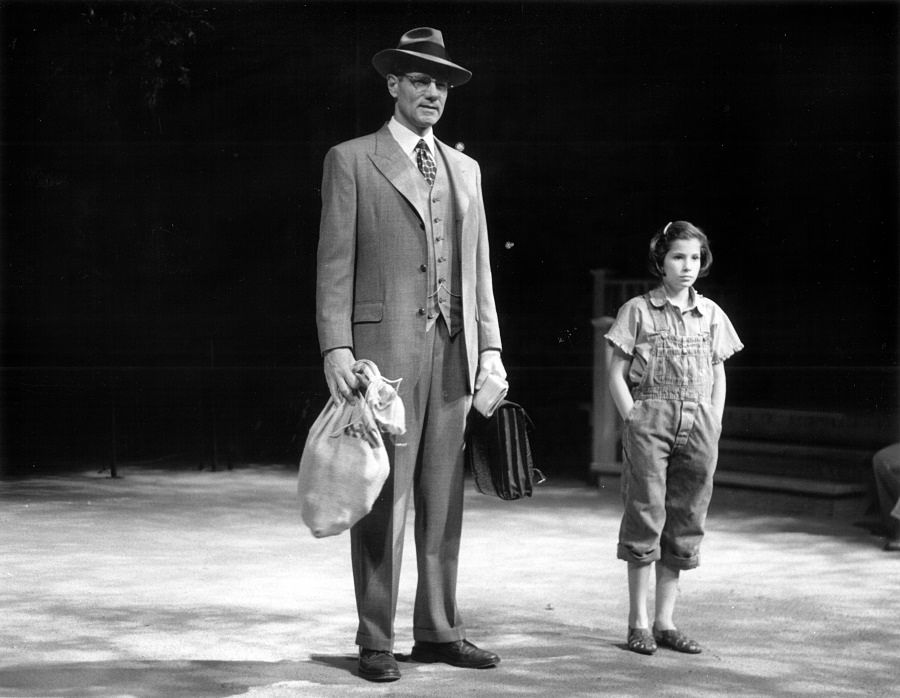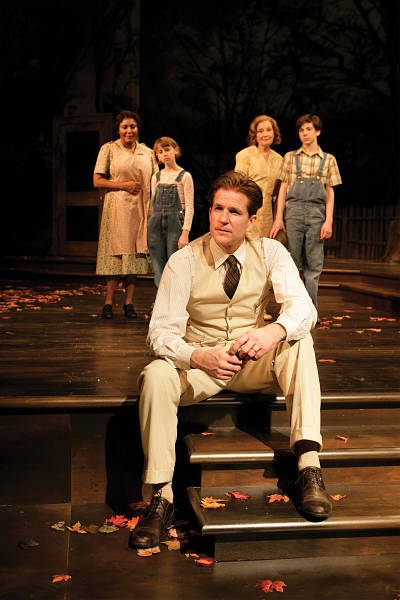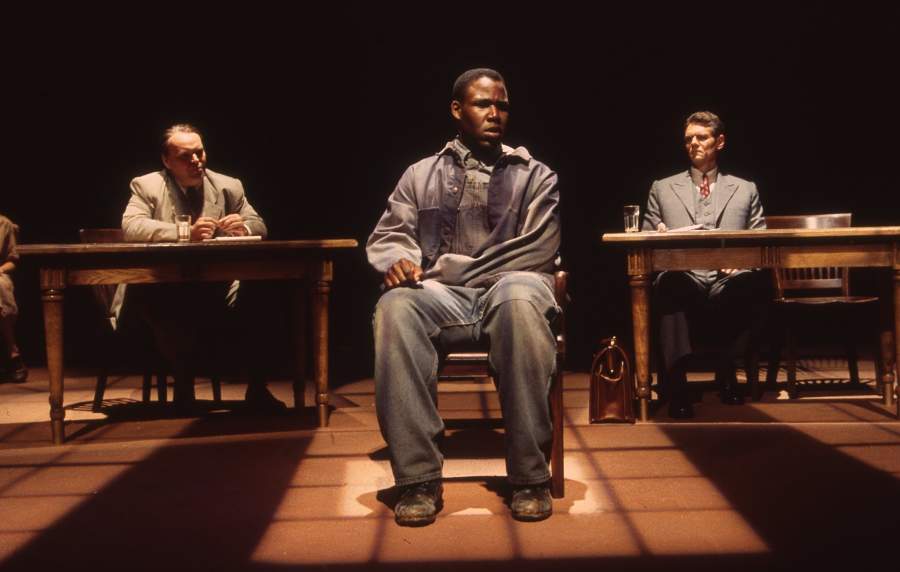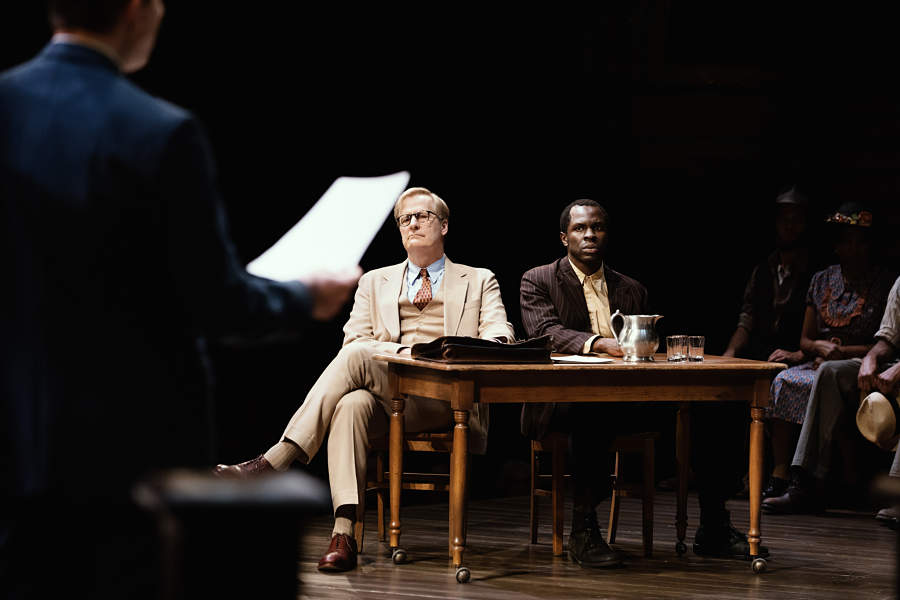To the casual theatre observer, a new stage version of To Kill a Mockingbird, starring Jeff Daniels, with a script by Aaron Sorkin, burst onto Broadway last winter, selling out every single seat for every performance and shattering box office records for an American play. More informed theatre mavens first heard about this new Mockingbird some months earlier, when it was reported that the estate of the original novel’s author, Harper Lee, sued the production over playwright Aaron Sorkin’s adaptation, only to be countersued by the show’s producer, Scott Rudin.
Now, as the play is again making headlines for the controversial last-minute cancellation of Mockingbird productions around the country—effected by legal threats from Rudin’s company, but with the silent backing of Harper Lee’s estate—the classic novel’s long, strange relationship with the theatre is finally coming to light.
The saga began shortly after Lee’s first novel became an unexpected smash. Since its publication in 1960, the book has sold more than 40 million copies and won the Pulitzer, while becoming a (mostly) beloved fixture of middle and high school reading lists. It was also adapted into an Oscar-winning film written by Horton Foote, starring Gregory Peck. All the attention proved too much for Lee, who gave her last interview in 1964 and never published another book.
But in 1965, Christopher Sergel, a playwright whose family ran the play publisher Dramatic Publishing (DPC), asked for permission to create a low-profile adaptation for schools, who were eagerly requesting a stage dramatization. The idea appealed to Lee, and in 1969 she signed on for Sergel’s faithful adaptation. “Lee read and approved it, writing that it had her support for stock and amateur productions,” said Chris Sergel, the playwright’s grandson, who now runs Dramatic Publishing. (His grandfather was president from 1970 until his death in 1993.)
That agreement, The New York Times recently reported, also forbade any stagings of Mockingbird within 25 miles of major cities (meaning those with a population of 150,000 or more at the time of the 1960 census) if a “first-class dramatic play” based on the novel were playing in New York or on tour. Though no such adaptation existed at the time, that language indicates that Lee believed Sergel’s version to be distinct from any hypothetical professional production—a notion reinforced in Mockingbird: A Portrait of Harper Lee, by Charles J. Shields, which says that around 1970 Lee’s agent fielded a request to adapt Foote’s screenplay for professional theatres. (That never happened, and Foote himself reportedly turned down several requests to try his hand at a stage version.)
Lee’s belief that she had not approved a professional version makes sense, said Charles Towers, who would later direct regional-theatre productions in the 1990s. “Large professional regional theatres were in their infancy,” Towers said, “and a world with 72 LORT theatres was not in anybody’s mind” when she signed the deal.
Early on Sergel’s play seems to have been done mostly in schools or by community theatres, but an uncredited version of Mockingbird began to surface at some regional theatres in the 1980s. Then, in the mid-1980s, a professional production of Sergel’s play toured Britain and played in London for months. This version made it to New Jersey’s Paper Mill Playhouse in 1991, with movie star George Grizzard as Atticus Finch, and got two reviews in The New York Times (one mixed, the other negative). In Shields’s opinion, this version “lacks nuance and is mainly the highlights of the book, meant for an audience familiar with the novel who want to see actors in the guise of Atticus and Scout.”
It didn’t seem to matter. Audiences loved Atticus and Scout in any guise. By 1994-95, Sergel’s Mockingbird was done professionally 10 times across the country, which, per American Theatre, made it the season’s third most-produced play. It remained on the Top Ten list for three years and was again a fixture on the list from 2008 through 2016.
Meanwhile an amateur production of Sergel’s script became an annual rite of spring at the courthouse in Lee’s hometown of Monroeville (the fictional Maycomb was based on the town and the film recreated the courthouse), drawing vital tourist dollars to the town. Kathy McCoy, who as director of the town museum in the old courthouse hoped to use the money to restore the building, hit upon the idea of doing the first act outdoors to put the audience in the town itself, moving into the courtroom for the second-act trial, and selecting a jury of 12 white men (the only people eligible back then) from the audience at intermission.
She took this version to Chicago, Washington, England, and Jerusalem, recalling a memorable moment there in 1996 when the “jurors came backstage when they were sent to deliberate and were begging me to let them change the verdict, to stand up for Tom Robinson.” (McCoy had to say no.) Just before that trip Lee wrote to McCoy, saying she’d heard the production would be reduced to vignettes. “I want to make sure you are doing the whole thing,” McCoy said Lee wrote, adding, “I am glad you are going.”

Meanwhile, the proliferating professional productions were evolving from Sergel’s initial adaptation. In the 1991 published version, he credited Chris Hayes, who directed the show’s U.K. tour, and Robert Johanson at Paper Mill with helping shape the “final form.”
But even that was far from final. In 1993, Towers was asked to direct the play by Ed Stern at the Cincinnati Playhouse in the Park. Towers, who didn’t like Sergel’s script, refused, but said Stern encouraged him to make the play his own. So he did, including switching the narrator: Sergel’s 1991 version was narrated by the Finches’ neighbor, Miss Maudie, but Towers gave that role to an adult Scout, a.k.a. Jean Louise, looking back on her childhood. Towers directed it three more times, and his version started making the rounds to other theatres. “Even before the Internet there were Xerox machines,” he said, adding, “I never received any credit for my script work.” (Still, there’s a 2015 Florida Times Union article referring to a “stage adaptation by Charles Towers.”)
Dramatic Publishing responded with a new Sergel version that cast Scout as narrator, which Towers said was a response to his version. “They needed to have a script that matched what was being produced in other places.” (Chris Sergel would not comment, saying it was before he was an executive at the company.) By Towers’s fourth Mockingbird, at the Huntington Theatre in Boston in 1996, the publisher was cracking down, and he had to restore some of Sergel’s words. “Nobody wanted a brouhaha; they just wanted a production.”
Towers said he was approached by Lee’s agent in the late 1990s about creating a new version for the professional market, but Lee scotched the idea. He says the agent told him that Lee “wanted all the productions to go away. There was a sense that if she endorsed a new one, even if it was better, it would lead to more productions.”
Added Shields, “She eventually resented anything that drew attention to her.”

When Michael Wilson was artistic director of Hartford Stage, he made his own stab at Mockingbird. A close friend of Horton Foote (he met Lee through Foote), Wilson knew that directors of Sergel’s version often lifted scenes from Foote’s screenplay without acknowledging or compensating him. “I had this idea to rectify that,” Wilson said. So he asked permission to adapt the screenplay for the stage, but Lee had a stroke in 2007, and when negotiations grew complicated, Wilson decided it wasn’t worth pressuring her. Still, he was determined to honor Foote, so in 2009 Wilson licensed Sergel’s version, embroidering it with parts of Foote’s screenplay. Foote attended the first preview of the show, which starred his daughter Hallie, just weeks before he died. “It was great to have done it for him, to see this come full circle at the end of his life,” Wilson says.
Others have sought the rights to create a new interpretation. Zak Berkman, producing director at Pennsylvania’s People’s Light, was especially keen to have a female playwright handle the adaptation. “It’s one of the essential American works written by a woman,” Berkman says, adding that he discussed it with Sarah Ruhl and that Lynn Nottage’s agent was enthusiastic, though Nottage says she declined the opportunity. In any case, Lee wouldn’t grant permission.
Nigel Shawn Williams, a Black Canadian actor and director, wanted to “focus on the racism and racial injustice,” which he feels that Sergel’s play “dilutes quite a bit.” He asked for permission to create a new version, but after finding the Lee estate “very protectionist,” he licensed the Sergel script for a production last year at the Stratford Festival, then blended bits from various Sergel versions and found other ways to take it to a “darker and more political place than I’ve seen before,” he said.
Williams’s staging included photos and footage of lynchings and protests, and drew more focus to characters like Calpurnia, the Finches’ housekeeper, as she reacted bitterly to the first utterance of the N-word. At the moment when it’s revealed that Tom Robinson was shot in the back 17 times as he tried to escape prison, Williams’s lights singled out the production’s Black ensemble, who turned to the audience and screamed.
Meanwhile Rudin and Sorkin, at work on their own adaptation, tangled with Tonja Carter, who represents the Lee estate. Carter had, on behalf of Lee, already proved divisive in Monroeville, and her push to publish Go Set a Watchman—Lee’s original novel, in which a less heroic Atticus is also an open segregationist—seemed unethical to some. It also seemed hypocritical that her objections to Sorkin’s alleged departures from Mockingbird concerned humanizing Atticus. “The problem of two Atticuses was brought on by Carter—she brought out Watchman,” Shields said.
After Rudin’s countersuit, the settlement had Sorkin relenting on some minor issues (Atticus would no longer own a gun or drink liquor) while holding firm on major changes. (Carter would not comment for this story.) Sorkin restructured the play to introduce the trial immediately, using it as the story’s framework to up the dramatic quotient and shift the emphasis some from Scout, Jem and Dill to Atticus. He also gave more voice and agency to Calpurnia and Tom Robinson, even at Atticus’s expense. When Atticus interrupts Tom at one point, in full white-savior mode, Tom cuts him off and insists on being heard. And when Atticus insists that Jem apologize for lashing out at a racist neighbor, he explains to Calpurnia that he believes “in being respectful,” to which she replies, “No matter who you’re disrespecting by doin’ it.”

As its “first-class dramatic play” of Mockingbird soared on Broadway, Rudin’s Atticus Limited Liability Company also set out to enforce the terms of the 1969 agreement proscribing Dramatic Publishing’s rights. The threat of a lawsuit shut down a long-planned tour of the Sergel-adapted Mockingbird in England. In early February Sergel was still claiming “this version is still available to many, many producers,” despite new restrictions, and there were still two dozen community and professional stagings slated for 2019.
Then the hammer came down. Loraine O’Donnell, executive and artistic director at the Kavinoky Theatre, a professional theatre at D’Youville College in Buffalo, had purchased the rights from Dramatic in December 2017; when she heard about the Broadway version, she called to double-check the status of her license, and Dramatic assured her, “We have an agreement with the estate.”
But on Feb. 20, 10 days before the Kavinoky’s production was to open, O’Donnell was one of numerous U.S. theatres who received cease-and-desist letters from Atticus LLC. O’Donnell contacted Dramatic, which claimed the license was still legitimate but that they would not indemnify her production. (Sergel did not respond to phone calls or email regarding any of the recent legal claims.) O’Donnell pleaded in vain with Rudin’s representative, but her lawyers concluded they didn’t have the time to investigate further, so she canceled the play, replacing it with 1984 (ironically, produced on Broadway in 2017 by Rudin).
John Fogle, artistic director of the Mugford Street Players in Marblehead, Mass., thought his theatre was in the clear because it is an amateur production. Nope: It was too close to Boston, a major city, during the Broadway run. After he got the cease-and-desist letter, he moved the production further from Boston, to Gloucester, where it opens March 29.
Most theatres weren’t so lucky. A front-page New York Times story on Feb. 28 told of small theatres and child actors having their shows shut down and their hearts broken by a powerful Broadway producer. Though Rudin was cast as the heavy in these stories, in an interview he said this role should go to Dramatic Publishing, which was in violation of its rights when it licensed these productions. Indeed he said that his company “went to DPC six months ago, as soon as we heard about any of these licenses, and put them on notice that they were licensing productions outside of the specific provisions of their contract. They chose to ignore the repeated notices we sent them. The bulk of their rights had expired, and they were left with only non-exclusive rights for amateur productions, provided they remain inside the legal mileage limit.”
Why did Rudin go after the theatres rather than Dramatic Publishing? “We don’t do anything about enforcing these rights issues without the estate’s participation and consent,” Rudin said, adding that the Lee estate has put Dramatic Publishing on notice “a dozen times” about their violation of the original licensing rights. He added that while Atticus LLC isn’t in a position to confront Dramatic directly, the Lee estate—and the theatres who suffered losses here and in the U.K.—do have legal standing. Bottom line, Rudin said, “We’re trying to address a wrong that wasn’t done by us, and trying to lessen the hurt caused to these theatres by DPC.”
Further assuaging the hurt, and countering the Grinch image created by the latest headlines, Rudin has offered any theatre who had licensed the Sergel version the rights to the Sorkin version instead—for free, and without a set time limit on when they can do the production. This gesture not only creates good will; it also effectively puts the final kibosh on Dramatic Publishing’s long, lucrative hold over professional stage rights to Lee’s novel. On Dramatic’s website under “Performing Group” type for Mockingbird rights, it now lists only high school, college, and community theatre.
Viewed from a certain perspective, these Mockingbird battles are a testament not only to the enduring power of the book but to the power of theatre, Towers believes. “Whether it’s Sorkin or Sergel or someone else, the play has always succeeded,” he said. “We’re all humbled by the majesty of this novel. When I was first asked to direct this, I thought, Why go up against that image of Gregory Peck? But the continued success of each version of the play shows that live theatre still matters—that live theatre still has its own power.”
New York City-based journalist Stuart Miller writes regularly for this magazine.


